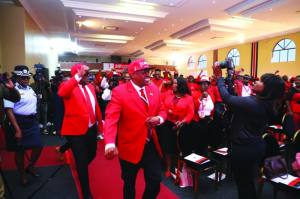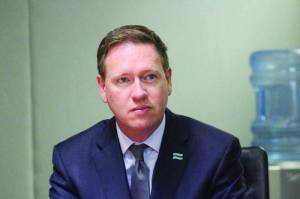In 1999, David Chizao Ngele, the first Motswana to go public with his HIV+ status, together with his fellow comrades in the then HIV anti-stigma support group, convened a lunch meeting at the Red Cross offices, under the auspices of the AIDS/STDs Unit with the aim of lobbying for more support from government.
Even though the meeting started off as an informal discussion, it would heat up towards 3pm in the same afternoon when one of the support group members suggested that the meeting be formally recorded. That individual would at the end of the meeting be elected the Chairperson of the interim committee, namely Ngele.
The AIDS/STD Unit then supported Ngele with the task of mobilising other potential HIV+ candidates and activists and not long after, along with his fellow comrades in the HIV anti-stigma struggle then, the Botswana Network of People Living with HIV and AIDS (BONEPWA+) was born and registered in 2000.
Little did the activists including Helen Ditsebe-Mhone, Dipuo Bogatsu and Elizabeth Mpule Montsheng amongst others, realise that their dream of building a network of People Living with HIV (PLHIV) would one day be crushed, but by whom actually? The names of the “vultures” are known to this publication.
With all the efforts put together by Ngele and company to recruit PHIVs to establish what would today be known as BONEPWA+, support groups were formed, and at least on record by 2011, there were 470 of them across the country, spreading as far as Chobe, Shakawe, Gantsi, Goodhope, Kgalagadi North and South, and the North East districts.
BONEPWA+ became the national umbrella body that would overtime seek to improve the livelihoods of PLHIV, through coordination, management of support groups. Core in its mandate, was to provide livelihood entrepreneurship skills and strategies, with the aim of strengthening linkages between prevention, care and support services.
Today, the PLHIV community and/or their support groups, especially those directly dealing with HIV and AIDS in Botswana, are experiencing governance and leadership challenges while local and international funding in the general scope of the civil society remains a huge institutional challenge. Several factors are influencing this state of affairs, including lack of accountability, poor accounting systems as well as diversion of funds aimed for specific grassroots projects. As a result, funds for the community have been dwindling over the years, at least since 2009.
Funding for the civil society almost completely faded away during the 2009 global financial crisis, and the situation has since then remained dire with ongoing global economic uncertainties, in the pre and post COVID-19 era.
Over the past few years, with the migration crisis in Europe, there has been a steady decline of resource access for NGOs from developing countries and institutions such as BONEPWA+ from medium-income developing countries like Botswana, have suffered the effects.
According to an article by Zein Kebonang and Kabelo Kenneth Lebotse entitled “Reflections on the Legislative Environment for Non-Governmental Organisations in Botswana” (International Journal for Non-for-Profit, Volume 12, issue 4, November 2010) constraints facing NGOs or civil society organisations are fairly numerous and range from lack of organisational capacity to lack of human capital. The authors further state that many NGOs are run by volunteers and often have no functional structures. Kebonang and Lebotse further outline that over and above this situation, these networks have severe financial distress as they most often operate with little funding or compete for funding from the same donors thus making it difficult to receive support anywhere.
Although civil society, as highlighted by Kebonang and Lebotse, is free to source funding anywhere, the withdrawal of major external donor agencies from Botswana has meant that many NGOs have had to rely on activities and programmes funded by government, with the National AIDS & Health Promotion Agency (NAPHA) becoming the key funding coordinator.
However, a big question that remains unanswered even in the sphere of donor conferencing on sustainability of funding for NGOs in Botswana is why networks such as BONEPWA+ have failed to tap into other thematic areas that could be opportunistic to the livelihoods of people living with HIV in Botswana.
A good example dates back to the year 2005, when BONEPWA+ through funding by the Swedish International Development Cooperation Agency (Sida) implemented a project to support vulnerable and disadvantaged groups such as home-based care patients and volunteers, out-of-school youths, widows/widowers, orphans and vulnerable children as well as people living with HIV countrywide. Bobonong, Mogobane and Mokubilo would eventually become centres of excellence for benchmarking by other community-based organisations and government departments on food security projects.
A total of 750 PLHIVs from BONEPWA+ affiliated supports groups directly benefited while 4,500 indirectly benefited. According to an article in his HIV and AIDS Research under the title “Family Chickens, Poverty Alleviation, Food Security and HIV/AIDS Mitigation: The case of BONEPWA+”, Dr John Moreki highlights the contribution of indigenous chickens to the livelihoods of PLHIVs.
Moreki states that the data he collected indicates that family chickens play an important role in food security, nutrition security, poverty alleviation, HIV/AIDS mitigation and economic empowerment of the vulnerable and disadvantaged members of the community.
Many in HIV activism and the civil society movement, argue that organisations such as BONEPWA+, to date, have failed to lobby government and other development agencies further of the fact that the then Sida funded food security project has laid the foundation for government to help mitigate the impact of HIV/AIDS on support groups. It is also in the clear sphere of civil society developments that BONEPWA+ has also failed to consider Dr Moreki’s conclusion that for the “food security” project to be sustainable it needed technical support and increased government extension service in family poultry production in order to reduce losses.
Instead, since 2010, the BONEPWA+ leadership has not seen the need to evaluate the impact of the project on the lives of its beneficiaries.







